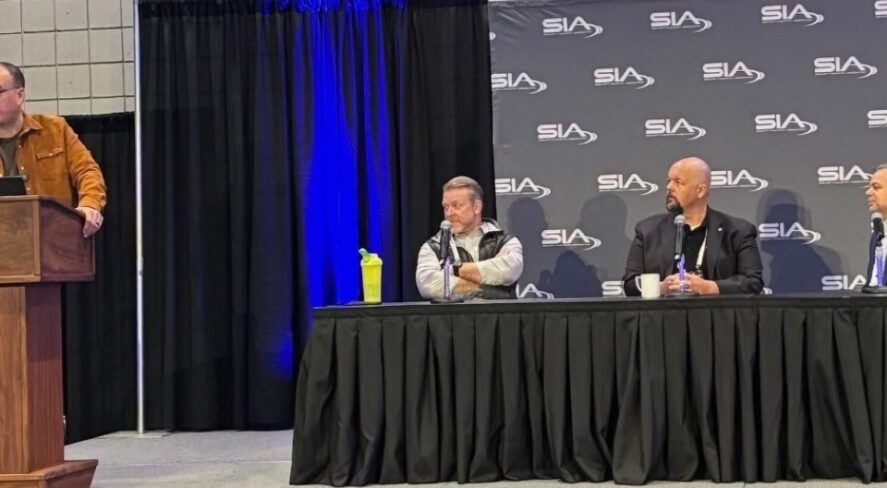Startup and Scale-Up Success Stories at ISC East 2025


On Nov. 19, 2025, at ISC East, I kicked off the Security Industry Association (SIA) Startups Experience event, hosted by the SIA’s Startups in Security community, with a simple goal: Set a tone that reflects where our industry needs to go and that need moves from future tense to present tense…today. Our industry has spent decades defined by incumbents and predictable growth, while the energy of most mainstream industries, the entrepreneurial energy, has been in the background. I wanted the morning to signal that the shift is not just underway, but is here and now.
Mature industries thrive when scale from incumbents and innovation from startups and scale-ups coexist. For too long, we have had only one of those forces. 2026 is the year the innovation engine, the startups and scale-ups, finally move to the center of the story.
That is why this show-within-a-show and the Startups area on the show floor mattered so much. They gave physical space and real visibility to founders and scale-ups building what comes next. They give voice and tell stories on stage and in the halls, where incumbents usually dominate. A healthy startup network lifts the entire global ecosystem. It brings new ideas, talent and urgency. It is what the mainstream looks like. And it benefits every company, both those already here and those yet to come. The work of SIA’s Startups in Security community is creating that structure. And there is room for more people and more companies to get involved. There is a need, there is momentum and, at this stage, actions will matter more than words.

The opening message was also a thank you. As I said, “These moments only work because people show up.” Thank you to all of you who have already shown up, and I look forward to welcoming the others who will join us.
From there, we flowed straight into our first panel, Startup Stories.
Instead of the usual “tell us your journey” panel, we broke it into four chapters that every founder knows all too well: 1) The spark, 2) the struggle, 3) the shift and 4) the ask.
Three founders—Mike Johnson, president of 78Dragons; Jason Veiock, founder and CEO of Bearing; and Mike Intag, co-founder and CRO of ElectricEye—joined me on stage, each at a different stage of the startup journey and with a different perspective. Each is searching for the same thing: a path to build something meaningful in an industry that often resists change.
The Spark: What started it all…
We opened with introductions and the moment that pushed each founder to leap.
Jason Veiock came from the end-user side, having served as GoDaddy’s chief security officer (CSO). He built something internally, caught the attention of a major software company with a venture arm and suddenly had the opportunity to turn an internal tool into a real business.
Mike Johnson founded his company after seeing energy waste in large multi-unit buildings. That led to the creation of a mesh protocol that can support a thousand devices through a single gateway. They had a technical spark, with a clear problem, and a product born out of frustration and creativity.
Mike Intag focused on integrity-based data insights, driven by a personal frustration with the status quo and a belief that the industry could make far better use of data.
All had different sparks, but the same pattern, and a problem too big to ignore.
The Struggle: What makes it hard?
No startup story is complete without the painful parts. And these founders did not sugarcoat them.
Bootstrapping came up first, where you wear every hat and work long before capital appears.
Timing came next. One team spent five years grinding before their technology was ready. Five years living on goodwill and trying to convince people to believe in something that was not yet ready to be shown.
Sales cycles kept coming up. Enterprise security deals move slowly. Relationships can take years to turn into revenue, and even when there is interest, the industry often resists innovation. Many buyers want things to stay the way they have always been.
Those realities drew many nods from the room.
The Shift: What is working now?
Then we talked about what has changed.
For some, the shift was finally having something tangible to show. Moving from describing the idea to demonstrating a working system. When you can prove it, conversations change.
For others, the shift came from the market itself. The COVID-19 pandemic accelerated hybrid work. Traditional networks are disappearing, and cost pressures have pushed companies to scrutinize everything from guard spend to false alarms. Suddenly, innovation is no longer optional—it is required.
Awareness around data, operational efficiency, and cross-departmental value is growing. And that is pulling new startups into simultaneous conversations with safety, facilities, security and executive teams.
The Ask: What do founders need?
The final chapter was the ask. Every startup has one at that particular moment in time.
Funding came up first. Not just capital, but clarity. What is the right model? How do early founders navigate it? Where can they find investors who understand the physical security market?
Education came up next, both investor education and industry education. Without better market data, more precise definitions and stronger benchmarks, founders are forced to reinvent the wheel every time they pitch. Multiple people noted the need for objective, consistent industry analysis that helps everyone (founders, buyers and investors).
Data came up repeatedly, and the feeling was that without real measurements, it is challenging to demonstrate value, model growth or tell a credible story.
A wider conversation: Market definitions, storytelling, data, AI, and more
The Q&A quickly turned into a bigger discussion about the state of the industry.
What is security? How do we define the market? How do we explain the total addressable market in a way that investors take seriously? How do we tell a consistent story when half the industry doesn’t agree on basic definitions?
We also touched on the economics of security and how companies measure returns. How CSOs communicate value in the language of the CEO and chief financial officer. And why the industry needs better data to support those conversations.
One comment stuck with me: The best security leaders do not try to educate executives on security. They speak the language of executives so that security becomes a business conversation, not a technical debate.
The founders then shifted into how they are using artificial intelligence (AI) across sales, marketing and customer success. Everything from AI sales development representatives to AI trained on podcasts, articles and sales calls to support consistent messaging.
The underlying theme was simple: When your systems share data, AI becomes useful. When they do not, AI becomes noise. This is an area where startups have a real advantage. They can build modern stacks from day one.
So, what comes next?
We identified a few important takeaways: We need shared definitions. We need better industry data. We need a centralized place for founders to share tools, playbooks and early learnings. And we need to keep building the connective tissue inside the Startups in Security community.
The conversation did not end when the panel did. We were followed by more discussions from Charles M. Johnson, Angie Barnes, and Mohammed Atif Shehzad on go-to-market strategies. Then Mark Eklund, Robert Chefitz and Jed Fochtman shared thoughts around funding your vision. Mario Doyle, Brett Ennals and Lori Hudnall discussed building your dream team.
We then shifted to quick startup strategy reviews with an advisory panel, where Charles Johnson, Mark Eklund, Annie Lan and John Nemerofsky provided some feedback and thoughts to a select group of start ups and scale ups. Thank you to Geoff Kohl at SIA for helping organize it all.
As I said on stage, no better angels are going to build this for us. If this ecosystem is going to grow, it will be because the people in the room today decide to push it forward.
All in all, this was great energy, great honesty, a great start.
If you were in the room, thank you. If you were not, there is a lot more to come. Let us keep building!
Learn more about the SIA Startups in Security community here.
